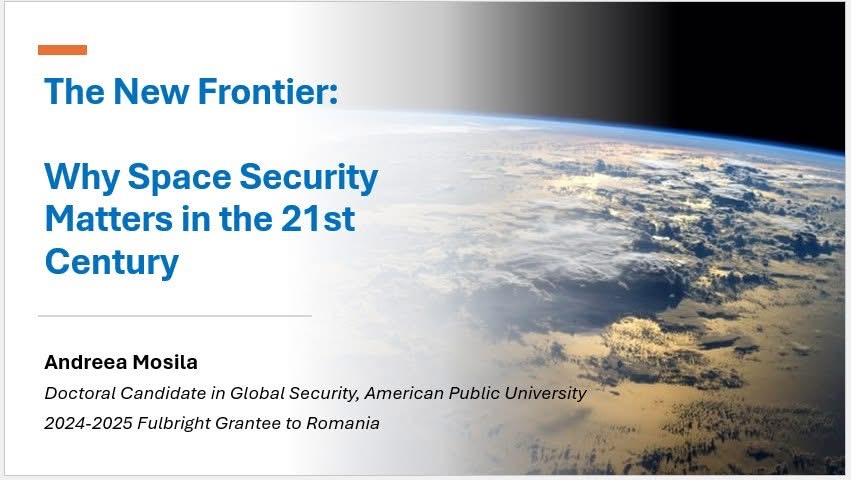Last week, I had the opportunity to present at the Blended Intensive Programme on Cybersecurity Strategies in the Era of Artificial Intelligence, hosted by Babeș-Bolyai University in Cluj-Napoca, Romania. The programme brought together researchers and students from across Europe to examine how artificial intelligence (AI) is reshaping the cybersecurity landscape. My contribution, titled “The New Frontier: Why Space Security Matters in the 21st Century,” focused on a dimension of cybersecurity that often goes underexamined, our growing dependence on space infrastructure and the risks that come with it.
Why Space Security Matters Now
Today, satellites are essential to modern life. They power navigation systems, global communications, weather forecasting, climate monitoring, financial transactions, and military coordination. In short, they form the invisible backbone of global infrastructure. But this critical domain is becoming increasingly congested, contested, and vulnerable. And in an era of AI-driven technologies and rising geopolitical tensions, the stakes have never been higher.
Congested, Contested, and Vulnerable
During my presentation, I explored how threats to space security fall into three broad categories. The first is congestion, with over 12,000 active satellites and thousands more planned by companies like SpaceX, OneWeb, and Amazon, Earth’s orbits are growing dangerously crowded. The second is contestation, space is now a theatre of geopolitical rivalry. Anti-satellite (ASAT) tests by countries such as China, India, Russia, and the U.S. have demonstrated the weaponization of space. The third is vulnerability, many satellites were not designed with cybersecurity in mind and are now increasingly at risk of disruption or manipulation, particularly from state and non-state cyber actors.
AI, Cyber Threats, and the Risk of Disinformation
One of the most striking examples I shared was the 2022 cyberattack on the Viasat KA-SAT satellite network during the early days of the war in Ukraine. The attack caused widespread internet outages across Europe and highlighted how space systems are now integrated into hybrid warfare. Another key point was the growing threat of AI-generated disinformation. Deepfake satellite images, falsely showing troop movements or environmental disasters, could be used to manipulate public opinion or justify military responses. As AI tools become more sophisticated, the potential for misuse grows.
AI-Driven Solutions in Orbit
But the presentation did not focus solely on threats. I also discussed emerging AI-based solutions that are helping to strengthen space security. These include predictive models for space traffic management, anomaly detection systems that can identify cyber intrusions in real time, and even quantum encryption protocols guided by AI to secure satellite communications. I highlighted projects like the European Space Agency’s ClearSpace-1 mission, which will use AI-enhanced robotics to capture debris, and Northrop Grumman’s Mission Extension Vehicle (MEV), which demonstrated autonomous satellite servicing in high Earth orbit.
Policy, Governance, and Public-Private Partnerships
Yet, these technological advances must be matched by progress in policy and governance. Current frameworks like the Outer Space Treaty and the UN’s space debris guidelines are outdated and unenforceable. We urgently need binding international agreements on space traffic management and cybersecurity, agreements that include not only traditional space powers, but also emerging nations and the private sector. Public-private partnerships are essential to building a resilient orbital ecosystem, and cybersecurity protocols must be extended to space systems as critical infrastructure.
A Global Challenge and a Shared Responsibility
As I reflected on these issues during the discussion and Q&A, I was struck by the level of engagement and curiosity from students and faculty alike. Cluj-Napoca, with its vibrant academic energy, proved to be the perfect setting for a conversation about the future of global security. It reminded me that space security is not just about technical systems: it is about people, policies, and the choices we make today that will shape the security environment of tomorrow.
Closing Thoughts: A Call for Collective Action
In closing, I offered this reminder: the future of security is not just on Earth, but in space as well. As we continue to expand humanity’s presence beyond our atmosphere, we must ensure that our systems are resilient, our technologies ethical, and our governance frameworks inclusive. The choices we make now, about cybersecurity, AI, and global cooperation, will determine whether space remains a shared domain for peace, discovery, and innovation.
If you would like to hear this presentation in full, I will be delivering it tailored for space professionals in September at the Space Education & Strategic Applications (SESA) Conference. I look forward to continuing the conversation there about how we can build a secure and sustainable future in space, together.

